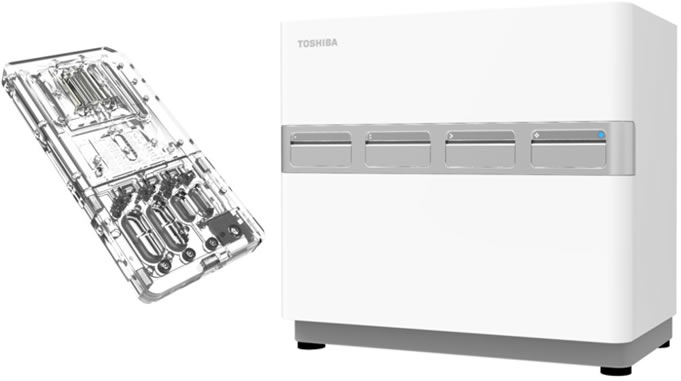2015.03.26
Toshiba Ltd and Kawasaki City develop a rapid and efficient DNA chip technology for simultaneously testing 14 major types of food borne pathogens in less than 90 minutes.
Rapid and efficient DNA chip technology for testing 14 major types of food borne pathogens
Conventional methods for testing food-borne pathogens is based on the cultivation of pathogens, a process that is complicated and time consuming. So there is demand for alternative methods to test for food-borne pathogens that are simpler, quick and applicable to a wide range of potential applications.
Now Toshiba Ltd and Kawasaki City Institute for Public Health have collaborated in the development of a rapid and efficient automatic abbreviated DNA detection technology that can test for 14 major types of food borne pathogens. The so called ‘DNA chip card’ employs electrochemical DNA chips and overcomes the complicated procedures associated with genetic testing of conventional methods. The ‘DNA chip card’ is expected to find applications in hygiene management in food manufacture, pharmaceuticals, and cosmetics.
Details
The so-called automatic abbreviated DNA detection technology ‘DNA chip card’ was developed by Toshiba Ltd and in a collaboration with Kawasaki City Institute for Public Health, used to simultaneously detect 14 different types of food-borne pathogens in less than 90 minutes. The detection sensitivity depends on the target pathogen and has a range of 1E+01~05 cfu/mL.
Notably, such tests would usually take 4-5 days using conventional methods based on pathogen cultivation. Furthermore, in contrast to conventional DNA protocols that require high levels of skill and expertise, the ‘DNA chip card’ only requires the operator to inject nucleic acid, thereby making the procedure easier to use and without specialized operating skills.
Examples of pathogens associated with food poisoning that were tested with the “DNA chip card” )
- Enterohemorrhagic Escherichia coli
- Salmonella
- Campylobacter
- Vibrio parahaemolyticus
- Shigella
- Staphylococcus aureus
- Enterotoxigenic Escherichia coli
- Enteroaggregative Escherichia coli
- Enteropathogenic Escherichia coli
- Clostridium perfringens
- Bacillus cereus
- Yersinia
- Listeria
- Vibrio cholerae
Figure caption
The so-called automatic abbreviated DNA detection technology ‘DNA chip card’ developed by Toshiba Ltd in collaboration with Kawasaki City Institute for Public Health. The technology enables the simultaneous detection of 14 different types of food-borne pathogens in less than 90 minutes. The detection sensitivity depends on the target pathogen and has a range of 1E+01~05 cfu/mL.







